Redditor Asks If They're Wrong For Not Wanting Their Dogs Offleash Near Roads
For most people, whenever they're taking their dogs for a walk on the road, they usually like to keep their dogs on a leash, regardless of whether it's a busy road or not. And it makes sense.
Letting your dog simply roam around roads without something that will help you keep them in check in case of an emergency is simply not advisable. It's dangerous and can put you or your dog in all kinds of trouble.
However, some people still train their dogs to go off-leash on roads. Usually, though, before pet owners take their dogs on the roads themselves, they ensure that their off-leash training and recall skills are nearly perfect.
This ensures that they still have some way to check in on their dogs, even without the leash. Unfortunately, not everyone understands the intricacies of having dogs off-leash, much like Redditor itistimetodisappear's mother.
While it's obvious that the off-lead training of their dogs isn't perfect, OP's mom likes to push boundaries, and sometimes, she takes the dogs a little too far. The worst part is that she seems to refuse to see reason when OP corrects her.
Now, OP is wondering if she's the one in the wrong. Here's the whole story.
OP asks:

OP has got the dogs trained somewhat to further enrich their walks
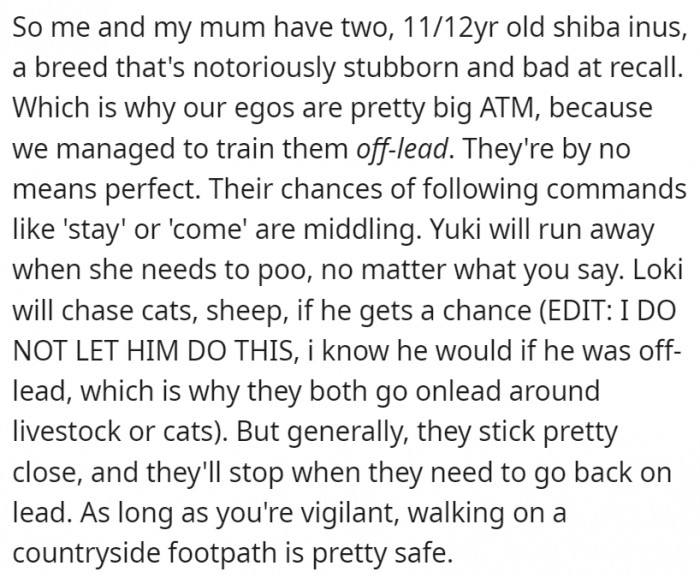
And it seems like the risks are so worth it

Understanding Behavioral Training Techniques
Dr. Jessica White, a behavioral therapist, emphasizes that training dogs in environments with distractions, like roads, can be beneficial for their development.
However, this approach must be balanced with the safety of both the dogs and their handlers.
Research in animal behavior suggests that exposure to real-world scenarios can enhance a dog's adaptability, but it should be done with caution and in safe environments.
Understanding Canine Behavior and Training
The notion of training dogs to behave appropriately in various environments is rooted in behavioral psychology. According to Dr. Janet Lansbury, parenting expert, "Proper training can help alleviate anxiety for both dogs and their owners, especially in potentially dangerous situations." The mother's insistence on off-leash training near roads likely stems from a desire to ensure her dog's safety while navigating these risks. However, differing training philosophies can create tension in familial relationships, as seen here.
However, it seems that her mom takes the dogs' unofficial training for granted
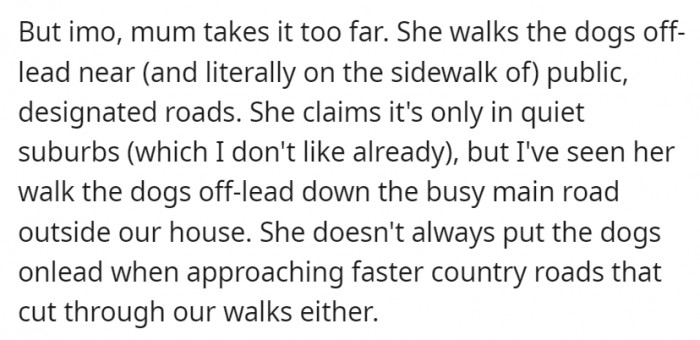
The mom also doesn't even attempt to follow the dogs when they're near trouble because of her bad knees
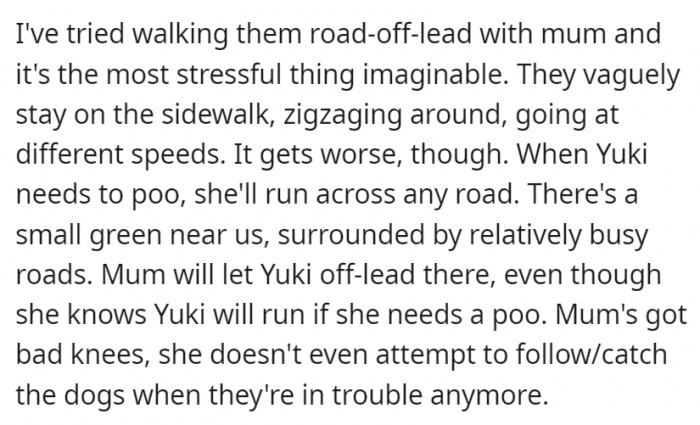
The worst part is she doesn't listen to her daughter about the dangers of having the dogs off lead near roads
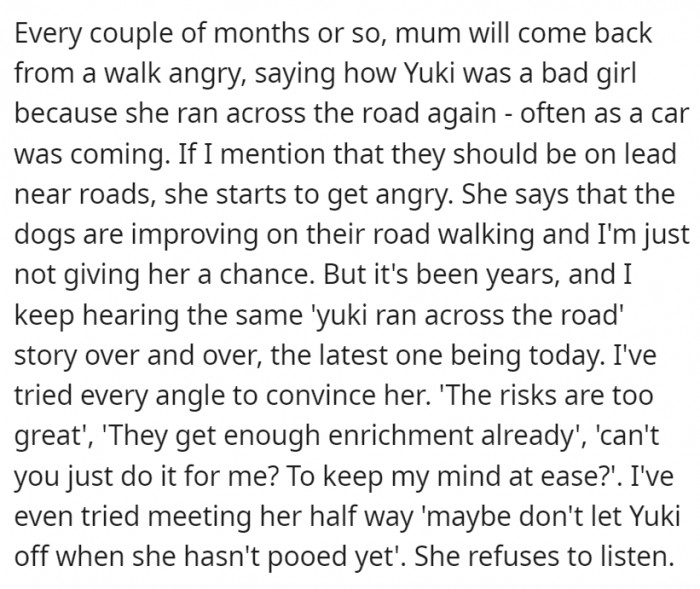
Moreover, studies demonstrate that allowing dogs off-leash in unsafe areas can lead to negative outcomes, not just for the dogs but also for their owners.
This highlights the importance of considering both the psychological and physical safety of all involved when making decisions about dog training.
Moreover, research in animal behavior suggests that training methods must align with the individual dog's temperament and needs. A behaviorist would argue that exposing a dog to stressful situations without proper guidance can lead to fear-based reactions, complicating future interactions. This reinforces the mother's concerns and highlights the importance of tailored training approaches.
She only gets upset when OP reprimands her. Now OP is wondering if she's the jerk in the situation

What OP's mom doesn't seem to understand is that even if the dogs are somewhat trained to go off-leash, there are many other factors that can compromise that training. On busy roads, those factors can endanger the dogs' lives.
By the looks of it, OP's mom isn't doing any additional training to ensure the dogs can walk well off-leash. So, they are really putting all of them at risk when they go near roads.
As it seems, many other commenters on the post share the same thoughts. Here are some of the top comments.
1. Simply put, OP's mom is gambling with the lives of the dogs every time she takes them out off-leash
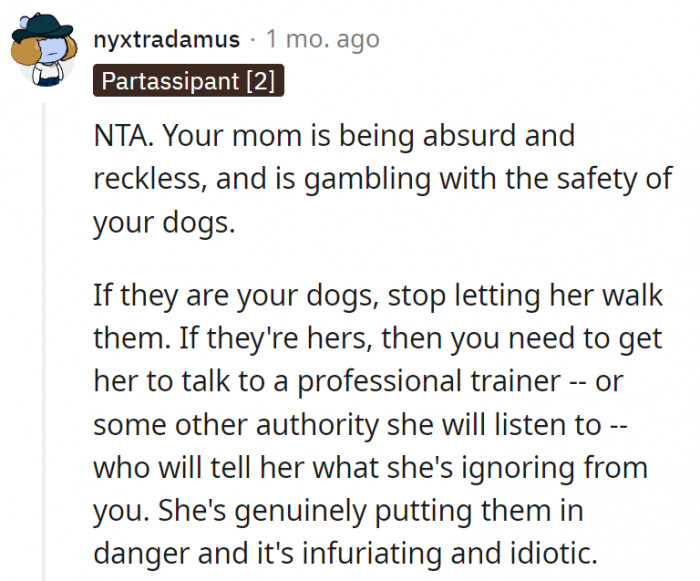
2. In addition to risking the dogs' lives, letting them simply run free near roads can cause accidents too
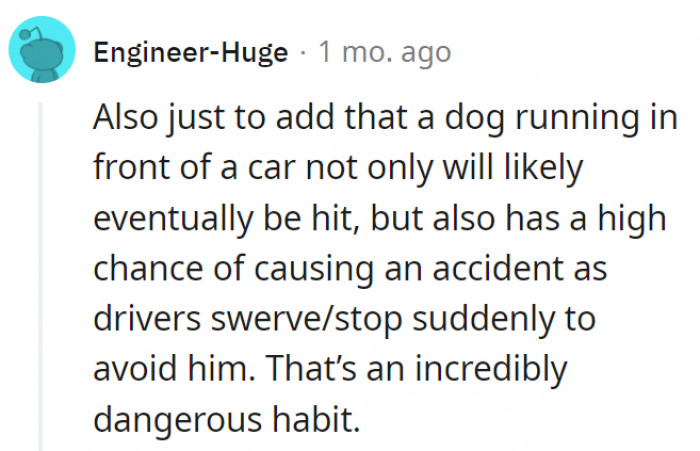
Addressing Family Dynamics and Safety Concerns
Family dynamics play a crucial role in decision-making processes regarding pets. According to Dr. Dan Siegel, a renowned child psychiatrist, "Family discussions about safety can often reveal differing priorities, which may lead to conflict." In this case, the mother's insistence on off-leash training may overlook the potential risks involved, leading to tension within the family.
Navigating Family Conflict Over Pet Care
Family dynamics can become particularly strained when differing philosophies regarding pet care come into play. A family therapist might suggest that establishing clear communication about pet care preferences is essential for maintaining harmony. Studies indicate that when family members feel heard and understood, grievances can be resolved more amicably.
Creating a family agreement on pet care routines, including training methods, can help align differing perspectives.
3. It's absolutely strange how OP's mom can't see the logic in the situation
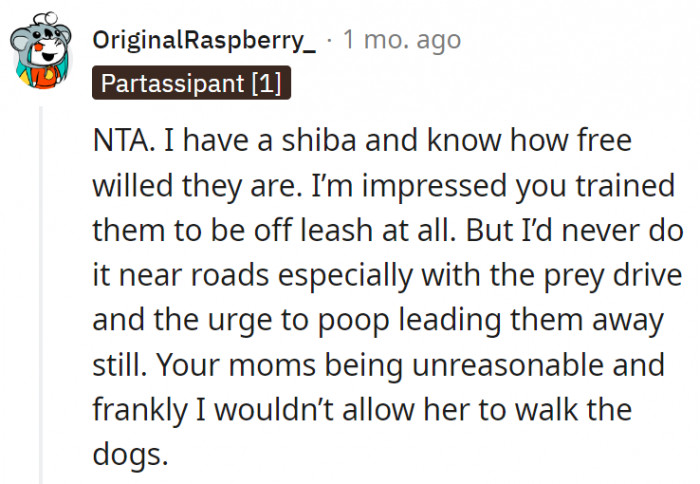
4. OP seems to be doing everything she can to be a responsible dog owner, while her mom seems to be doing the opposite
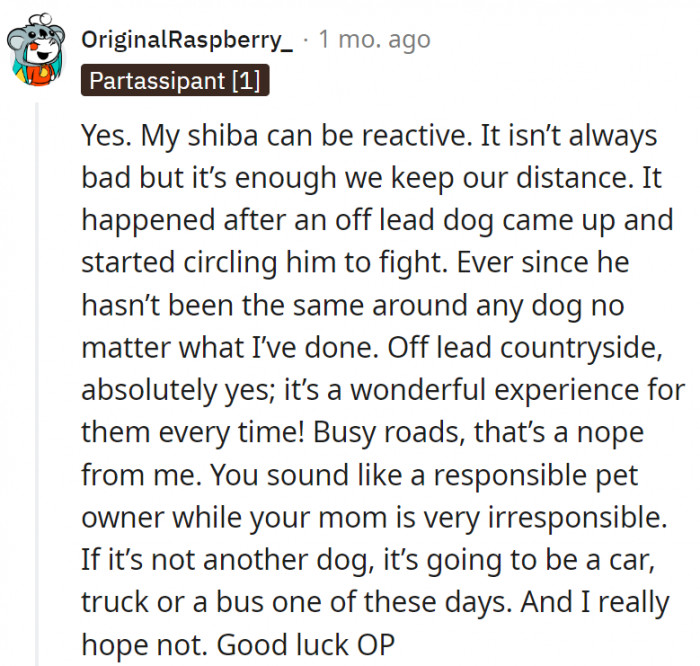
5. It takes just one distraction
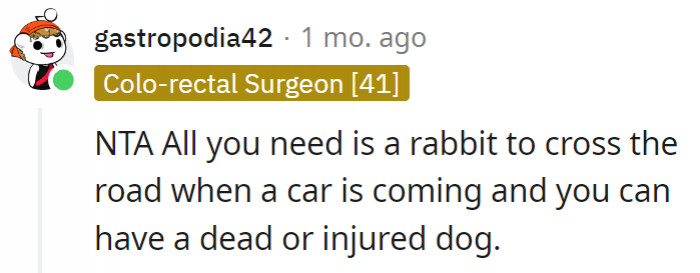
A practical approach might involve discussing the risks associated with off-leash training in high-stress environments, emphasizing the importance of safety for both the dogs and pedestrians.
Encouraging a dialogue about the training objectives can lead to a more informed decision-making process.
Additionally, involving a professional trainer could provide valuable insights into effective training strategies that satisfy the concerns of both parties. Research supports that collaborative approaches in training not only improve outcomes for the pet but also enhance family relationships, creating a more supportive environment.
6. Dogs can be unpredictable in places like roads, and OP's mom is putting them at risk by just letting them roam free off-leash

7. OP's mom is risking more than just the dogs' lives
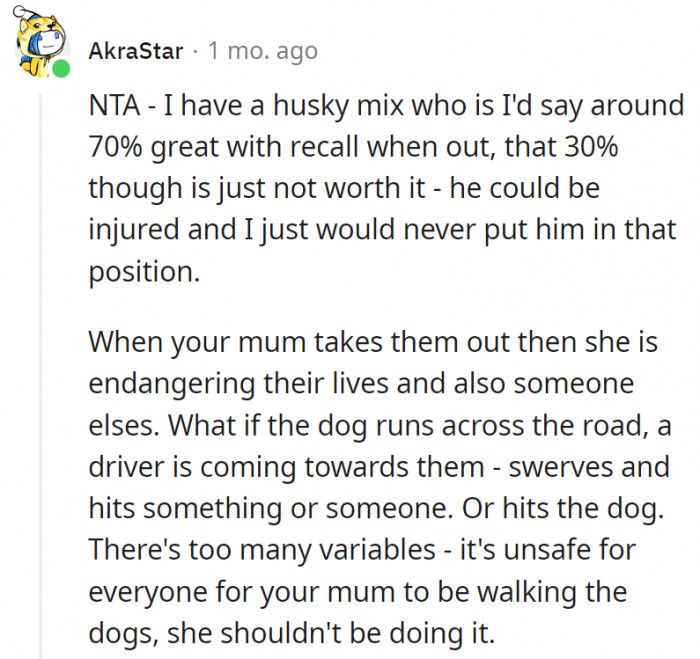
8. Constant training is key; however, dogs can still be unpredictable, so the risks are always significant

The Role of Empathy in Pet Training
Empathy is essential in understanding the perspectives of both pet owners and their dogs. Research shows that empathy can significantly enhance training outcomes, as it fosters a deeper connection between the handler and the pet.
When family members empathize with potential risks, they are more likely to work together to find solutions that prioritize safety.
9. You just don't know if they'll come back to you when it counts

10. The dogs are simply not trained enough to be trusted near roads
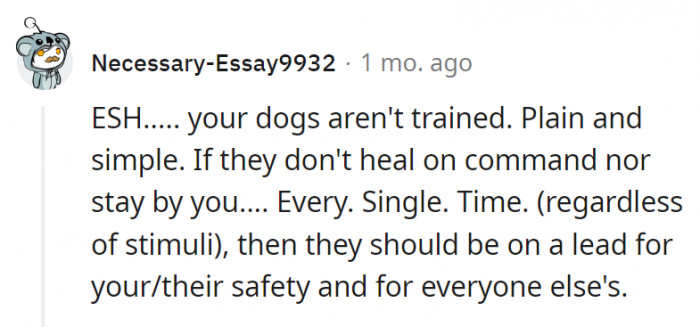
11. It's better to be safe than sorry
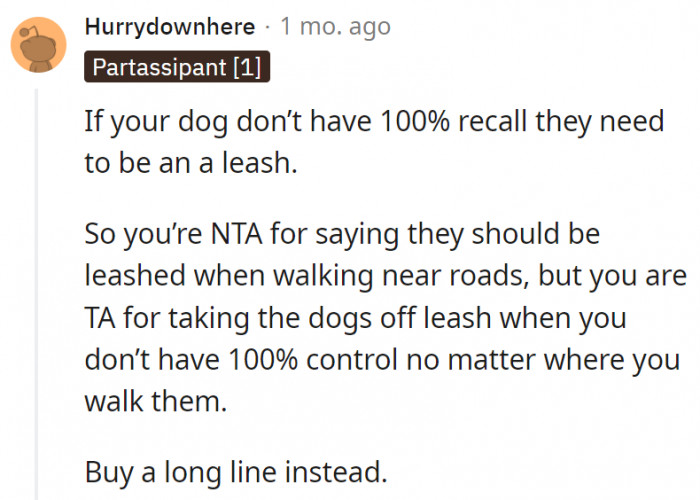
Encouraging family discussions about the emotional and physical welfare of the dogs can help create a more cohesive approach to training and safety.
This collaborative effort can lead to better practices that align with safety concerns while still promoting effective training.
12. Risks shouldn't be glazed over for the sake of convenience
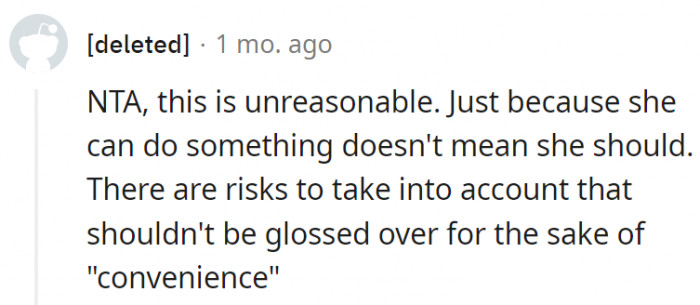
13. OP's mom doesn't seem to be properly considering the risks for the dogs and other people
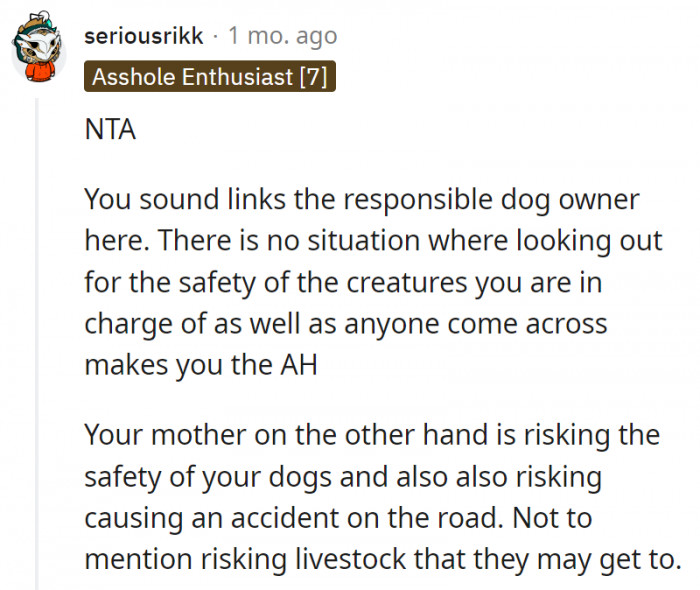
Plus, she may just be unraveling any training that OP is doing
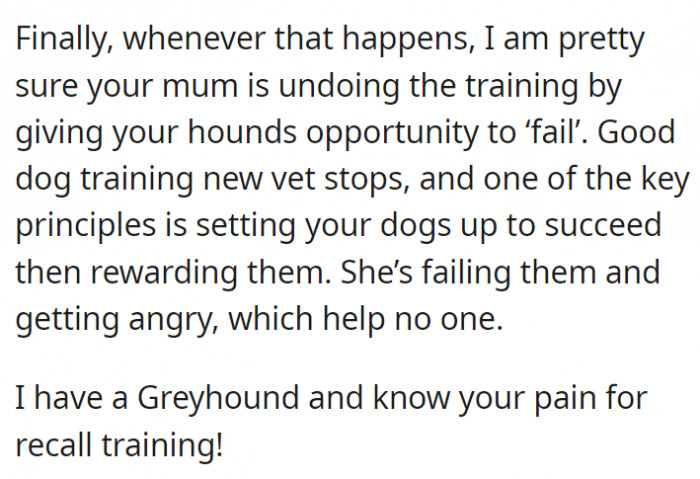
Navigating Conflicts with Understanding
Conflict resolution within families often requires understanding and compromise. Studies indicate that approaches emphasizing collaboration rather than confrontation can lead to more positive outcomes.
This situation illustrates the necessity of fostering dialogue about differing views on dog training methods.
14. Irresponsible is the right word

15. Dogs need consistency, but not the kind of consistency the mom is dishing out
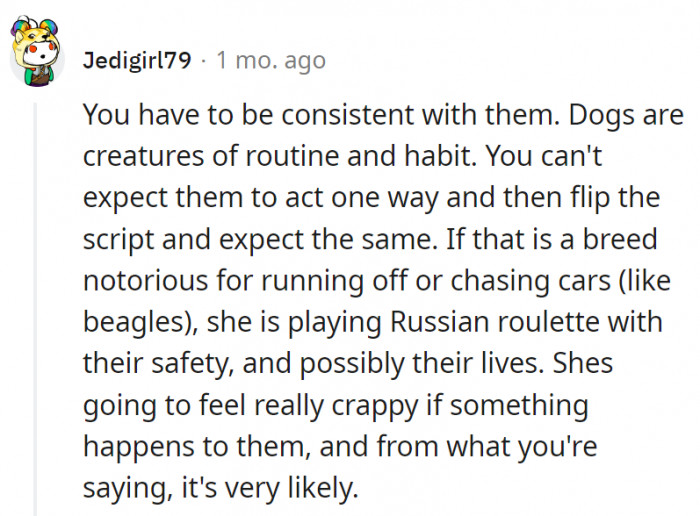
OP's mom is simply putting the dogs' lives at risk with what she's doing. They're not going to improve, especially if she's not really training them to get better anyway.
In fact, they're likely to get worse, and in the long run, they might end up in the kind of trouble OP doesn't want to see them in. Hopefully, OP's mom sees reason so that they can be on the same page about the dogs.
It's important to keep the dogs happy, but it's also crucial to keep them safe.
Psychological Analysis
This situation illustrates the complexities involved in differing pet care philosophies within families. The mother's protective instincts reflect a deep understanding of her dog's needs, while the conflicting viewpoints highlight the necessity for open dialogue. Encouraging collaboration can foster a supportive environment for both the pets and their owners.
Analysis generated by AI
Analysis & Alternative Approaches
In conclusion, navigating disagreements over pet care requires sensitivity and collaboration. Research shows that open communication and involving professionals can greatly enhance understanding and cooperation among family members. As noted in the Journal of Applied Animal Welfare Science, effective training and care practices can lead to healthier relationships between pets and their owners.
Practical strategies could involve establishing a training plan that incorporates safety measures while still allowing for effective learning experiences, ensuring everyone feels heard in the process.
This way, the family can work together to create a positive training environment that respects the needs of both the dogs and their humans.
Analysis & Alternative Approaches
In summary, balancing effective dog training with safety considerations is essential within family dynamics. By fostering open communication and empathy, families can work toward resolving conflicts while promoting the well-being of their pets.
Ultimately, the goal should be to create a safe and supportive environment for both dogs and family members, enhancing relationships and training outcomes.



